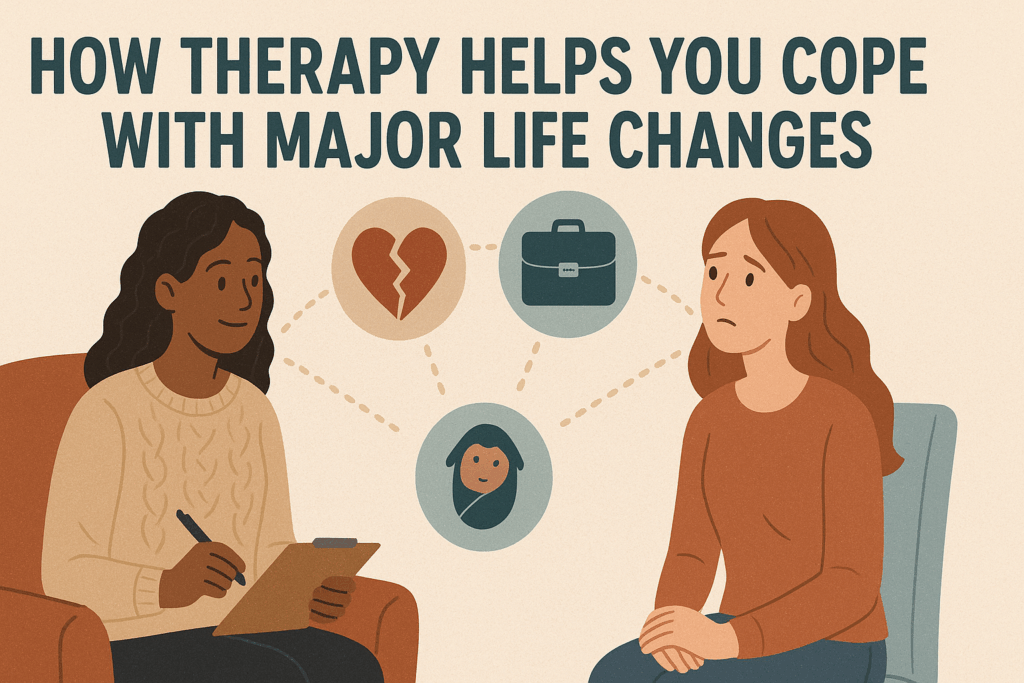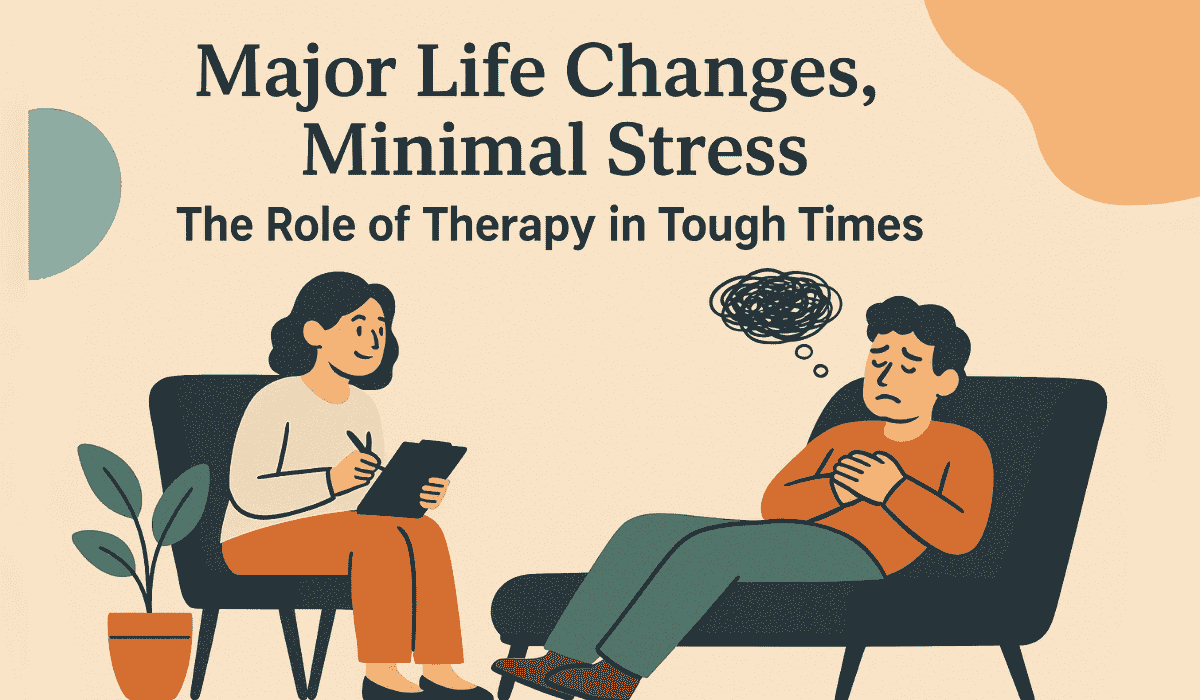Whether it’s moving to a new city, starting a new job, ending a relationship, or becoming a parent — major life changes are unavoidable. But let’s be honest: even the most exciting changes can come with a healthy dose of anxiety. It’s normal. Still, when stress starts to feel like a storm cloud following you everywhere, it might be time to consider therapy for anxiety during major life change.
“Change is hard at first, messy in the middle, and gorgeous at the end.”
This quote by Robin Sharma rings especially true when you’re going through a life transition. Therapy can help you navigate the mess in the middle — with clarity, confidence, and calm.
Why Change Triggers Anxiety
Let’s break it down. Why do major life changes shake us so deeply?
- Loss of control: We like to feel in charge. Big changes often bring uncertainty.
- Fear of the unknown: What’s next? Will it work out? What if I fail?
- Sense of loss: Even positive change can mean saying goodbye to something familiar.
- Pressure to adjust fast: Society often expects us to “bounce back” instantly.
Anxiety often comes from trying to answer questions we can’t possibly predict. And while feeling nervous is part of being human, chronic anxiety during transitions can wear you down. That’s where therapy becomes your safe space.
Is Anxiety Holding You Back?
Ask yourself:
- Do you feel paralyzed by indecision?
- Are you overwhelmed with “what if” thoughts?
- Has your sleep or appetite changed recently?
- Do you avoid new opportunities because you fear the unknown?
If you answered yes to any of the above, you’re not alone — and you don’t have to push through it by yourself. Anxiety is often a silent passenger on the journey of change. But therapy can help you take the wheel.
How Therapy Helps You Cope with Major Life Changes

When people think of therapy, they often imagine lying on a couch talking about their childhood. But modern therapy is far more dynamic and practical — especially when dealing with major transitions.
1. Provides Emotional Grounding
Life changes can feel like your emotional foundation has been shaken. A therapist helps you rebuild that foundation by:
- Listening without judgment
- Helping you label and process your emotions
- Creating space to feel safe even when life feels uncertain
Think of it as putting your feet back on the ground when everything else feels up in the air.
2. Reframes Negative Thought Patterns
Therapy for anxiety during major life change often includes cognitive-behavioral techniques (CBT) that teach you to spot unhelpful thoughts and reframe them.
“What if I mess this up?” becomes
“Even if it’s not perfect, I’ll figure it out.”
This isn’t about “positive vibes only.” It’s about realistic optimism. And that’s powerful.
3. Helps You Develop Coping Tools
Feeling anxious? Your therapist can help you build a toolkit to handle those tough moments. These might include:
- Breathing exercises and grounding techniques
- Journaling prompts for clarity
- Scripts for difficult conversations
- Mindfulness and meditation practices
You don’t need to rely on willpower alone. Tools make it easier to manage stress in real-time.
4. Gives You Permission to Slow Down
Sometimes the most radical thing therapy offers is permission — to rest, to not know the answer, to take it day by day. When you’re feeling pressure to rush into your “next step,” therapy reminds you that slowing down is not failure. It’s wise.
5. Encourages Self-Compassion
Many people going through big changes beat themselves up for struggling. “I should be able to handle this.” Sound familiar?
Therapy helps challenge those harsh inner voices. It reminds you that needing support doesn’t make you weak — it makes you human.
“You’re allowed to be a work in progress and a masterpiece at the same time.”
Different Types of Therapy That Can Help
Not all therapy looks the same. Here are a few approaches that are particularly helpful during big transitions:
- CBT (Cognitive Behavioral Therapy): Focuses on reframing thoughts and behavior patterns.
- ACT (Acceptance and Commitment Therapy): Encourages mindfulness and value-based living, even in discomfort.
- Solution-Focused Brief Therapy: Helps you identify short-term goals and strengths.
- Narrative Therapy: Helps you rewrite the story you’re telling yourself about this life change.
You and your therapist can decide together which approach best fits your needs.
What Happens in a Therapy Session?
If you’ve never been to therapy before, it might feel intimidating. Here’s what a typical session might look like:
- Check-in: How have you been feeling? Any specific moments of stress or relief?
- Explore triggers: What situations or thoughts are increasing your anxiety?
- Skill-building: Practice strategies for managing emotions.
- Reflection and planning: What do you want to work on between sessions?
Most importantly, therapy is a judgment-free space. You don’t have to “have it all together” when you walk in the door.
Real Talk: Therapy Is Not Just for “Crisis Mode”
A common myth is that therapy is only for when everything is falling apart. But many people go to therapy simply because they want to grow, adapt, or find clarity in a transition.
You might be getting married, starting a business, or planning a move — all exciting things! But even good change is stressful. Therapy can help you adjust with more ease and intention.
“Therapy Saved My Life”: A True Story
A client once said, “I wasn’t sleeping. I was snapping at people I love. I didn’t recognize myself after the layoff and move. Therapy didn’t just help me cope — it gave me back my sense of self.”
This is the hidden gift of therapy for anxiety during major life change. It not only helps you survive — it helps you thrive.
Final Thoughts: You Deserve Support
If you’re facing a transition right now — big or small — know this:
You don’t have to carry the weight alone.
You’re allowed to struggle.
You’re allowed to seek help.
Therapy offers more than just strategies. It offers connection, understanding, and a reminder that you’re doing the best you can with what you’ve got. That’s more than enough.
So, if you’ve been wondering, “Is anxiety holding you back?” — it’s time to find out what’s possible when you give yourself the support you truly deserve.
Ready to Begin?
Therapy for anxiety during major life change isn’t just about “fixing” something. It’s about gaining insight, peace, and confidence — no matter what life throws at you.
Find a therapist who feels like a good fit. Ask questions. Show up. Take the first step.
You’re not just getting through change.
You’re growing through it.
FAQs
What exactly is therapy for anxiety during major life change?
It’s a type of mental health support that helps you manage the stress, fear, and uncertainty that often come with significant life transitions — like moving, career shifts, relationship changes, or health issues. This therapy gives you tools to cope, build resilience, and regain emotional balance.
Is anxiety holding you back from making big life decisions?
If you find yourself overthinking, procrastinating, or avoiding change due to fear or worry, anxiety might be the cause. Therapy can help uncover the root of your anxiety and teach you how to move forward with clarity and courage.
Can therapy help even if the life change is a positive one (like a promotion or wedding)?
Absolutely. Even positive changes can trigger anxiety due to added responsibilities, expectations, or fear of the unknown. Therapy for anxiety during major life change supports you in processing emotions and adjusting with ease — no matter how “good” the change seems.
How do I know if I need therapy or if I’m just stressed?
Occasional stress is normal, but if anxiety is affecting your sleep, appetite, relationships, or ability to make decisions, it may be time to seek therapy. When in doubt, talking to a therapist can help you figure out what’s normal and what needs deeper attention.
What types of therapy work best for life transitions and anxiety?
Cognitive Behavioral Therapy (CBT), Acceptance and Commitment Therapy (ACT), and Solution-Focused Brief Therapy are highly effective for transitional anxiety. Your therapist will help choose the approach that aligns best with your goals and personality.
How long does therapy usually take to help with anxiety during a life change?
It depends on your unique situation. Some people see improvement in just a few sessions, while others may benefit from ongoing support over several months. The key is consistency and finding a therapist you trust.
I’m already overwhelmed. How can I fit therapy into my life right now?
Many therapists offer flexible scheduling, including evenings, weekends, and virtual sessions. Remember, therapy isn’t another “task” — it’s an act of self-care that helps everything else feel more manageable.
Is therapy only for people in crisis or with serious mental health issues?
Not at all. Many people seek therapy during life transitions to gain clarity, process emotions, and build confidence. You don’t have to be in crisis to benefit. In fact, starting therapy before things get overwhelming can be especially effective.
How do I find the right therapist for anxiety related to life changes?
Look for therapists who specialize in life transitions, stress management, or anxiety disorders. You can ask about their approach in an initial consultation to see if their style feels supportive and relatable to you.





